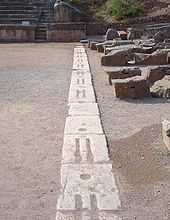Pythian Games


The Pythian Games (Greek: Πύθια; also Delphic Games) were one of the four Panhellenic Games of Ancient Greece, a forerunner of the modern Olympic Games, held every four years at the sanctuary of Apollo at Delphi.[1] They were held in honour of Apollo two years after (and two years before) each Olympic Games, and between each Nemean and Isthmian Games. They were founded sometime in the 6th century BC, and, unlike the Olympic Games, also featured competitions for art and dance. The art and dance competitions pre-dated the athletic portion of the games, and were said to have been started by Apollo after he killed Python and set up the oracle at Delphi. Otherwise, the athletic events were the same as the Olympic Games. A four-horse chariot race was held in a hippodrome in the plain, not far from the sea, in the place where the original stadium was sited. (ref: Pindar)
According to Ovid, in the formative years of growth after the deluge, mother earth accidentally produced a gigantic Python that terrorized the humans. Apollo successfully killed it, though it required almost every arrow from his quiver. To ensure that no one forgot about this heroic deed, he created the Pythian games to commemorate his victory.
The winners received a wreath of bay laurel, sacred to Apollo, from the city of Tempe, in Thessaly. Smaller versions of the Pythian Games were celebrated in many other cities of the Levant and Greece.
History
The historical timeframe of the Pythian Games starts 582 BC, when the administration of the Games was handed over to the Delphic Amphiktyonia, a council of the twelve Greek tribes, to end the Holy War in the past. Since then they did not take place every eight years as in the past, but every four years, one year prior to the Olympic Games, presumably end-August.
In the beginning, only musical contests were held in the Pythian Games then extended by singing to instrumental performances. These retained great importance as also in the other big Festivals, although with the new rearrangement of the Pythian even the gymnastic competitions and the chariot racing and horse riding found its introduction to the games.
During the Delphic Games, which lasted three months, the Holy Delphic Peace was announced. The ceasefire guaranteed the people – participants and spectators – to travel without risk to the Games and back to their homeland. The enthusiasm of the public seems clear. Scores of people flock out of entire Greece, bringing in substantial revenue to the city. The Agora, the Market took place during the Games, and became a very important significant emporium for the Arts. Despite the rise of Christianity in the Roman Empire during the 4th century, Delphi remained an active pagan site and the Pythian Games continued to be celebrated at least until AD 424.[2]
Overview
Unfortunately, the testimonials and documents covering the Delphic Games were mainly destroyed through human violence and natural catastrophes. All the remaining resources highlight the glory and glamour of the Games. The records of Aristoteles present an overview about the festivities: the Games lasted for six to eight days and were started by a Holy Game, which showcased the victory of Apollo over Python. In a festive and glamorous Procession a “Festival Sacrifice” was performed in the Temple of the Apollo. After four days of festivities the Games began.
The Music and Theatre Play competition were carried out in the Theatre, the athletic contests in the Stadium of Delphi. The chariot races were carried out in the nearby plain of Krisa, taking into account the hilly landscape of Delphi.
The musical disciplines included:
- A Hymn addressed to Apollo, the god of arts and music.
- Aulos (reed pipe) and Kithara (an old Greek string instrument) with or without singing
- Acting and Dance Competitions
- Painting Competitions
The Delphic Games were honorary Games. The winners received a wreath of bay laurel, sacred to Apollo, from the city of Tempe, in Thessaly. Smaller versions of the Pythian Games were celebrated in many other cities of the Levant and Greece.
See also
References
- ↑ Pythian Games, Encyclopædia Britannica.
- ↑ Gregory, Timothy E. (1991). "Delphi". In Kazhdan, Alexander. Oxford Dictionary of Byzantium. London and New York: Oxford University Press. p. 602. ISBN 978-0-19-504652-6.
External links
| Wikimedia Commons has media related to Pythian Games. |
- Michael Scott. Delphi: The Bellybutton of the Ancient World. 20:56 minutes in. Retrieved 24 April 2015.
| ||||||||||||||||||||||||||||||||||||||||||||||||||||||||||||||||||||||||||||||||||||||||
Coordinates: 38°28′57.60″N 22°29′52.97″E / 38.4826667°N 22.4980472°E